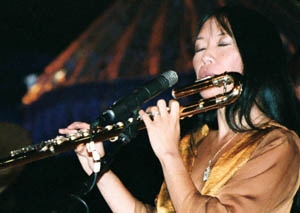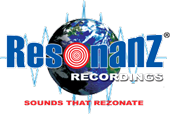Suzanne Teng Interviewed for Grammy

Suzanne Teng is interviewed as part of a Grammy Article on Healing Music.
Article below taken from Grammy official website here
Liquid Mind Over Matter
April 24, 2008
Musicians make a case for the healing and therapeutic powers in their meditative music
GRAMMY.com
Jon Matsumoto
For Los Angeles-based musician/composer Chuck Wild, life began to spiral down into a pit of anxiety, panic attacks and agoraphobia in 1987 when he spent three exhausting months composing music for the ABC-TV series "Max Headroom." Wild was driving himself into the ground with an insane 20-hour-a-day, seven-day work week.
Contributing to his state of high anxiety were deep feelings of loss and depression triggered by watching more than 50 friends die of AIDS during the height of the global epidemic.
Wanting to eschew the anti-anxiety medications that made him feel spacey and drowsy, Wild began to seek out alternative methods of treatment including music, which he hoped would have a sedative effect. To his dismay, he found that truly relaxing music sustained over more than one album track was extremely difficult to find.
"There was tons of ambient music out there, but it tended to be dark and I needed something uplifting," says Wild, who first made a name for himself as the keyboardist for the popular '80s new wave rock band Missing Persons. "But once I was able to leave my house in early 1988, I would go down to Laguna Beach and listen to the ocean while sitting on the rocks. The constant sound of the waves made me incredibly relaxed."
This experience at the beach inspired Wild to create Liquid Mind music, which attempts to produce those calming sensations he felt while listening to the ocean waves. His self-described sedative music avoids all percussion and rhythm in its quest to create soothing sonic textures that are constant and sustained, yet melodic. Today, his nine Liquid Mind CDs are not only used in homes but in schools, hospitals and even veterinary clinics across the United States.
There are numerous other musicians today creating and recording therapeutic music as well. Flutist Suzanne Teng, a world musician who also records and performs therapeutic music, has seen the interest in healing music grow not only in the general public, but also in the mainstream medical field.
Besides releasing her own CDs and recording music for film and television, Teng has recorded music for instructional yoga and acupuncture DVDs. She's also recorded an album called Healing Sounds for Genentech, Inc., a leading biotechnology company that has embraced the concept of music as a healing tool. Genentech has distributed 30,000 copies of the CD to breast cancer patients to aid in their healing process according to Teng's Web site.
"There's more demand for this music; people are more receptive to it," notes Teng, who lives in Topanga, Calif. "It's helped that the yoga world has grown. It's so enormous — as one market grows so does the other. It's just nice to see that the music has tapped into the mainstream. Before, I wouldn't call some of what I do flute meditations because that sounded too 'airy fairy' to some people. But that's not the case anymore. Now I call them flute prayers, which takes it even a step further."
Compass Productions, a Minneapolis-based company that produces relaxation and healing CDs for Target stores, is not reluctant to declare the therapeutic intent in some of its Lifescapes CD titles. Sample titles include Celtic Music For Stress Relief, Zen Meditation and Music For Healing. The latter CD was produced by Dean Magraw, who composed many of the tracks while battling non-Hodgkin's lymphoma.
Tony Braasch, executive producer of the Lifescapes series, says the company has received numerous touching letters and e-mails from people extolling the virtues of its healing music. "Listening to what the customers say makes it all worth it," says Braasch. "It's a wide range of responses. A surgical clinic in Whittier, Calif., wrote in and said, 'Whittier is a low-income area [and] most of our patients have not heard of meditation and have never experienced relaxation CDs. The patients become so relaxed that they fall asleep [when we play your CD at our office]. It's perfect because we want them to think of us as a place of healing, not some place to dread.'"
Somerset Entertainment in Toronto has even enlisted the help of medical professionals in creating therapeutic CDs on its Solitudes label. Calming Massage was designed by Dr. Tim H. Tanaka to help calm the mind and regulate breathing, particularly as a complement to a massage or a relaxing activity. Another CD titled Music To Inspire Creativity was designed by Dr. Lee R. Bartel to sequentially boost Alpha, Theta and Beta brainwave states and inspire and support the creative thinking process.
"There's an album of ours called Natural Massage Therapy that I love as well," states music producer Gordon Gibson, son of late Somerset Entertainment founder Dan Gibson. "If I put it on immediately my brain waves will slow down. I've listened to it so many times and the effects are so in tune with me that I can just start to listen to it and I can feel a physiological change. This comes after 200 listens. I didn't believe that your brain would do that, but it clearly does."
Gibson admits that he's encountered skepticism over the claims that certain Somerset CDs can boost qualities such as creativity. He considered producing an album designed to boost the immune system, but ultimately decided against it. Gibson felt the general public wasn't ready to embrace such a concept.
Meanwhile, Wild is on a quest to establish concrete scientific evidence that his Liquid Mind music is therapeutically viable. He has plenty of anecdotal evidence from people who have sent him letters and e-mails extolling the healing virtues of his music. The next step, he says, is to establish scientific studies that will support the innumerable positive comments he has received about his music.
"I'm trying to get a research partner to do a research study on how ultra slow music, which is what my music is called, affects people with sleep disturbance," says Wild. "So many people report spontaneously falling asleep and being able to sleep for the first time in years. I have e-mail after e-mail. That's led me to wanting to get real solid proof."
Wild is also quick to point out that sedative music isn't a panacea. He notes that he overcame his panic and anxiety disorders with a combination of therapeutic music, meditation and psychotherapy. "For me, the music replaced the Xanax."
(Jon Matsumoto is a Los Angeles-based freelance writer.)











Post new comment